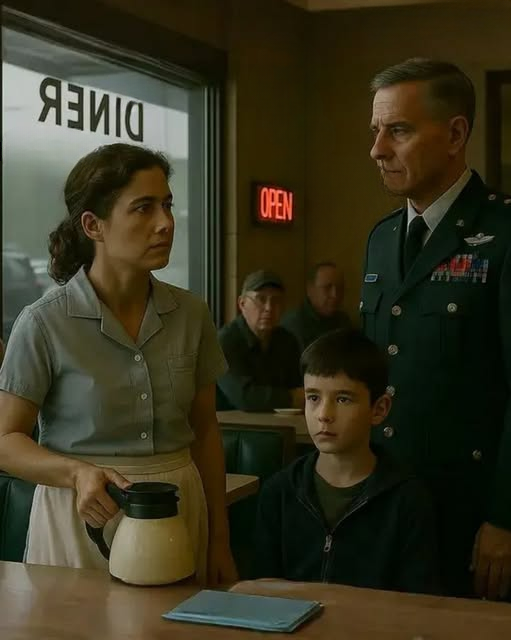Every morning, Jenny greeted the regulars with a smile that hid the loneliness she carried. She lived alone in a small one-bedroom apartment above the local pharmacy. The only photos of her family had long since faded, their colors yellowed with age.
Her father died when she was 15, and two years later, her mother passed away too. The aunt who had raised her moved to Arizona for her arthritis, leaving Jenny with little more than occasional phone calls during holidays and the occasional letter.
One Tuesday in early October, Jenny first noticed the boy.
He looked no older than 10, smaller than most kids his age, with careful eyes that seemed to observe everything but gave away nothing. He sat alone in the corner booth farthest from the door, a backpack too big for him resting beside him, and a book always open on the table.
The first day, he ordered only a glass of water. Jenny brought it with a smile and a paper straw. He thanked her with a barely noticeable nod. The second day was the same, and the third and fourth days too. By the second week, Jenny had figured out his routine.
He arrived at exactly 7:15, 45 minutes before school started at the elementary three blocks away. He would sit quietly, reading and slowly sipping his water, watching other customers enjoy plates piled with pancakes, eggs, bacon, and toast. At 7:55, he’d close his book, thank Jenny quietly, and leave without having eaten a bite.
On the 15th day, Jenny accidentally brought him a plate of pancakes. “Oh, I’m sorry,” she said, setting the plate down as if surprised. “The kitchen made an extra. I’ll just leave it here instead of wasting it.” The boy looked up, a mix of suspicion and hunger in his eyes. “It’s okay,” Jenny reassured him. “Sometimes orders get mixed up. Better to eat than throw it away, right?” She walked away before he could refuse, watching from behind the counter as he hesitated, then slowly took a fork. When she came back ten minutes later, the plate was empty, but the boy’s gaze stayed fixed on his book, deliberately avoiding eye contact — and Jenny’s heart cracked a little.
“Thank you,” he whispered when she took the plate away. This became their silent ritual. Every morning, Jenny brought an extra plate—pancakes one day, scrambled eggs and toast the next, oatmeal with brown sugar as the weather cooled.
The boy never asked for anything, never spoke beyond a soft “thank you,” but he ate every bite, often so fast it seemed like he was afraid the food might disappear.
One morning, Harold, a retired postal worker who sat at the same stool every day, asked, “Who’s that kid you keep feeding? Never seen his parents?”
Jenny shrugged. “I don’t know, but he’s hungry.”
After three weeks, Kathy, the cook, pulled Jenny aside. “You’re feeding a stray,” she said, not unkindly but with a realism born from experience. “If you keep giving handouts, they don’t learn to stand on their own. He’ll vanish one day — they always do.” Jenny didn’t argue. She just shrugged and said, “I used to be that hungry too.” It was the most personal thing she’d shared with her coworkers in the three years she’d worked at Rosie’s.
The boy never told Jenny his name, and she never pressed. There was something in the way he moved—how he entered and left carefully, how he positioned himself to see both the door and the window—that told her questions would only drive him away. Instead, she made sure his water was always full, his pancakes always warm, and that the diner was a place where he could breathe freely for 40 minutes each morning.
Sometimes, when the diner was quiet and the boy was absorbed in his book, Jenny let herself wonder if he lived nearby, if he had family, why he was always alone, and why hunger seemed to follow him like an unwanted shadow. But she pushed those thoughts aside.
In her experience, kindness with conditions wasn’t kindness at all. So she kept their silent routine going, noticing the boy’s shoulders slowly lose their constant tension, and seeing his eyes meet hers for just a bit longer each time she approached. That tiny change—a moment of connection stretching from a blink to maybe two seconds—was enough to convince Jenny that what she was doing, however small, mattered.
By the sixth week, others had noticed Jenny’s routine with the boy. Most stayed quiet, but some couldn’t help commenting, their words sharp with the cruelty of those who’d forgotten what it’s like to need help.
“Playing charity worker on company time?” sneered a businessman who frequented the diner.
“Kids these days expect handouts everywhere. Must be the times,” muttered another regular.
“In my day, no one gave free food just because someone looked sad,” said yet another.
Jenny heard the remarks but let them slide off like raindrops on glass. She had learned early that defending kindness often only hardened the hearts of critics.
But Mark, the diner’s manager, wasn’t so easy to ignore. One morning, he called Jenny into the small office behind the kitchen, his face serious beneath a perpetually sweaty brow.
“I’ve been watching you with that kid,” he said, tapping his fingers nervously on the laminate desk. “You can’t have employees giving away free meals. It’s bad for business and sets a precedent.”
Jenny twisted her apron in her hands, caught between her heart and the rules.
